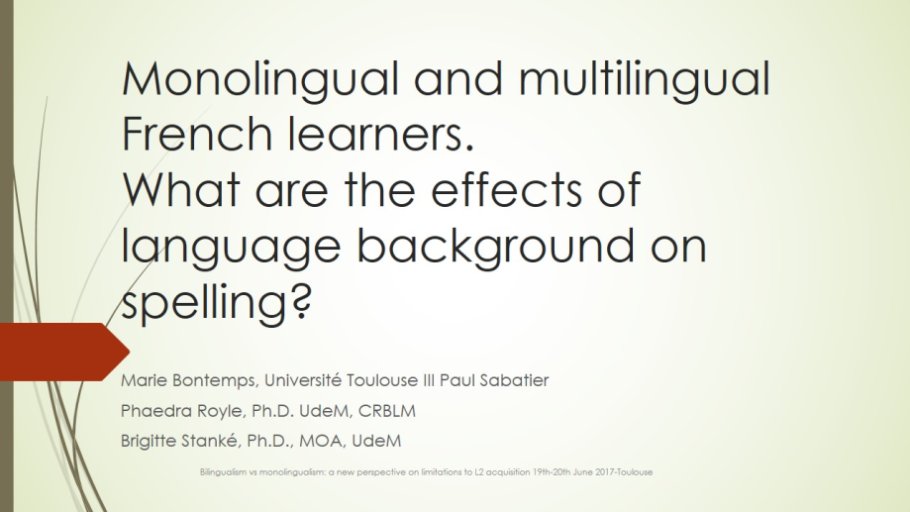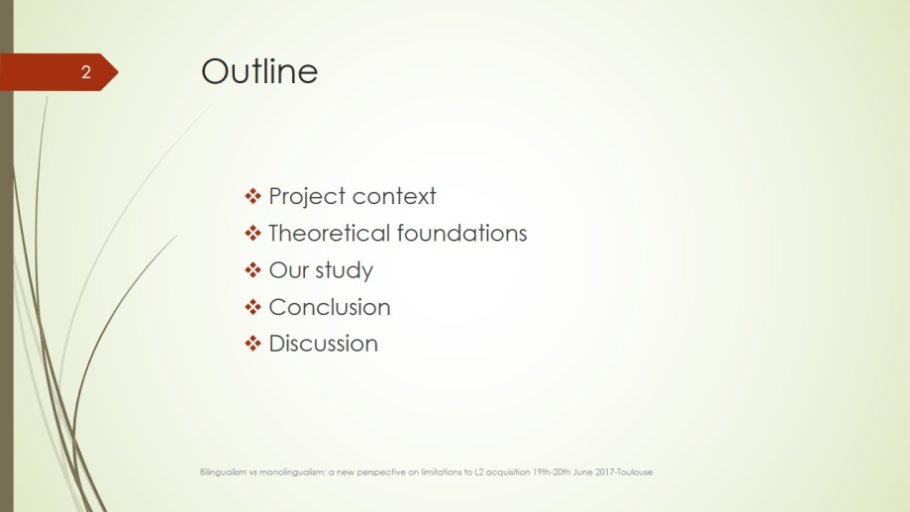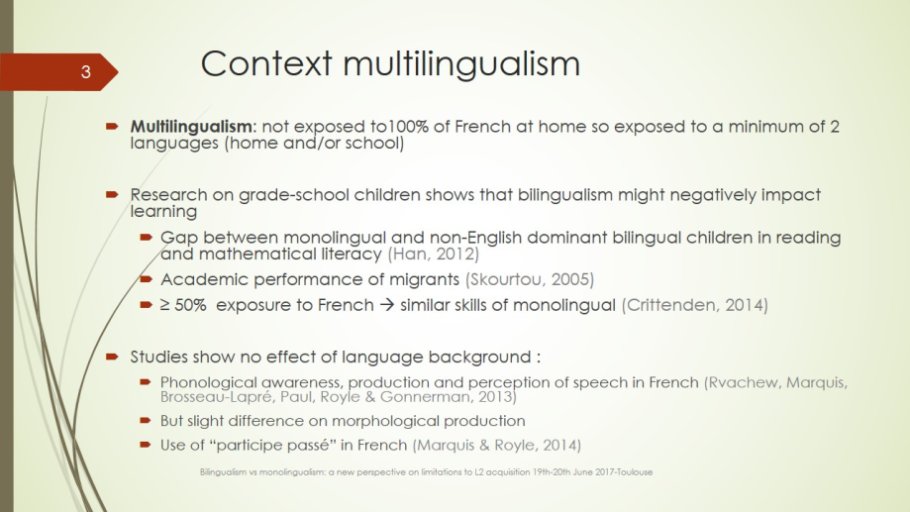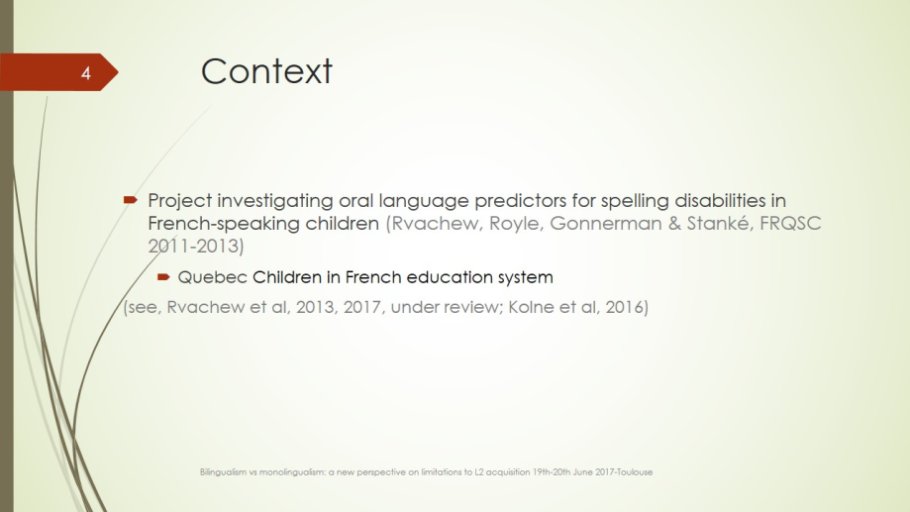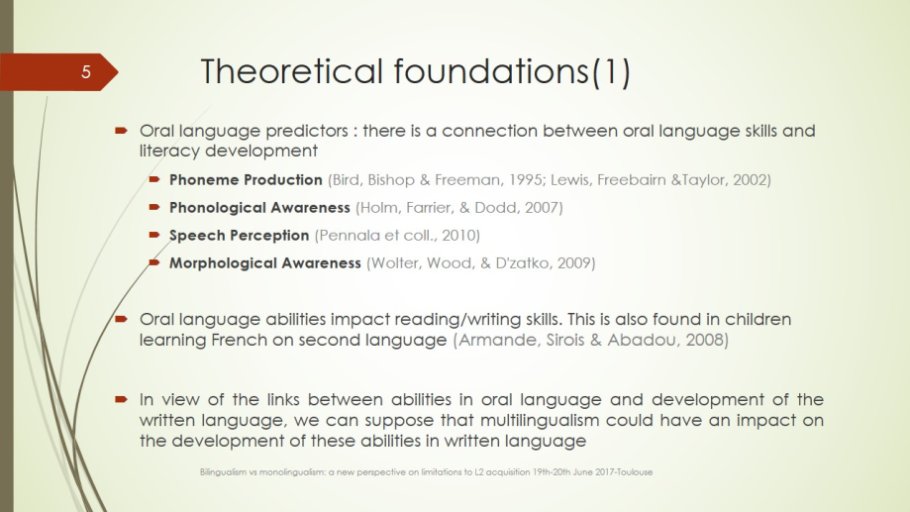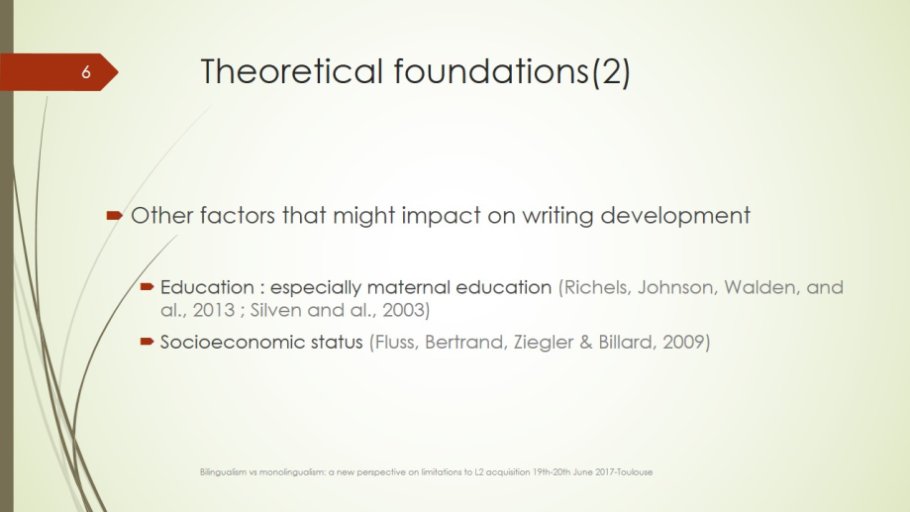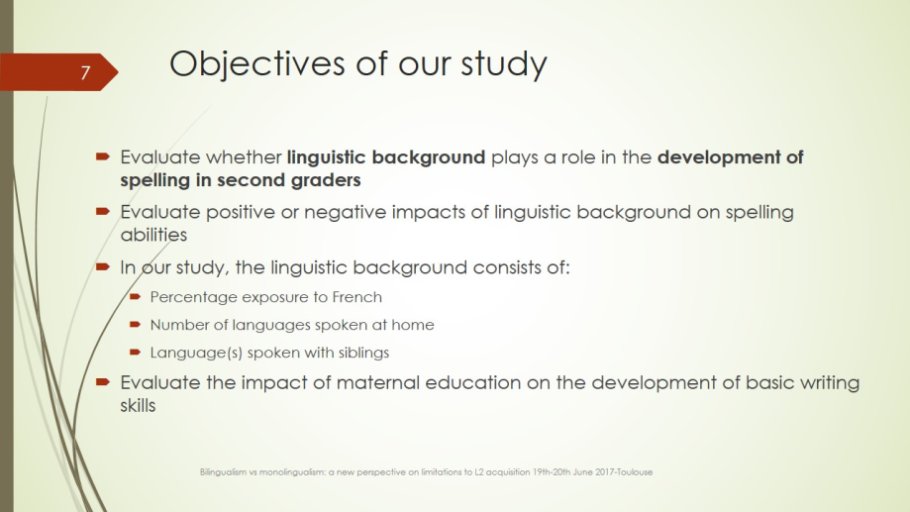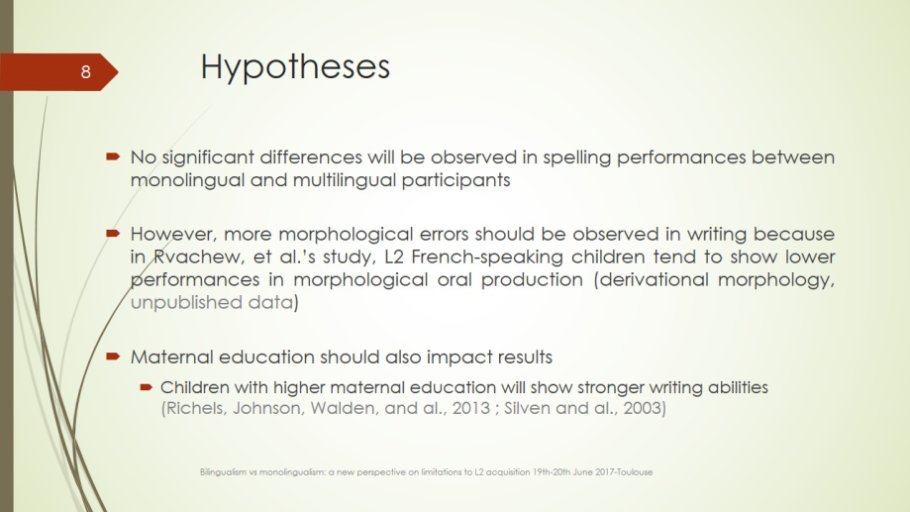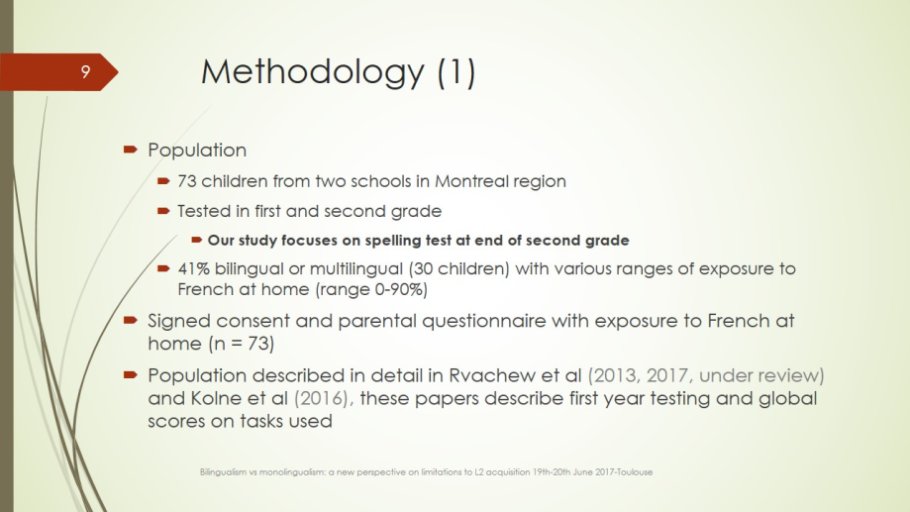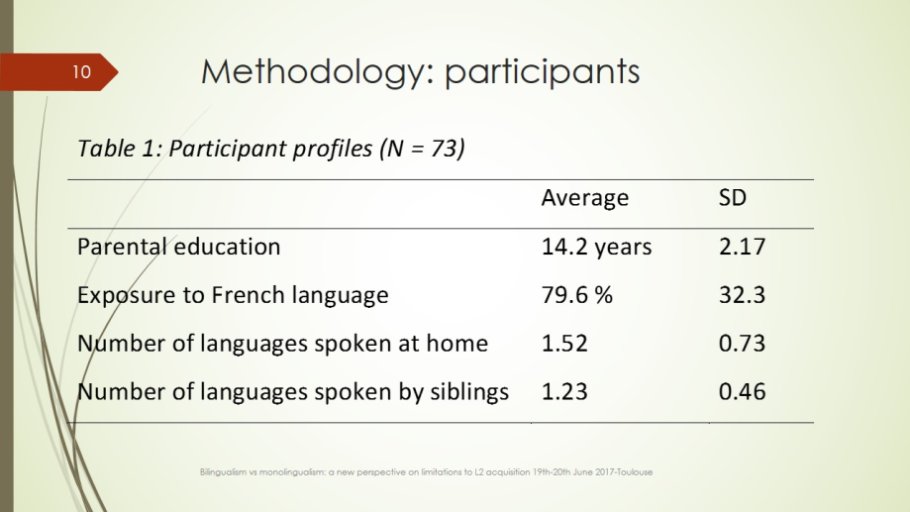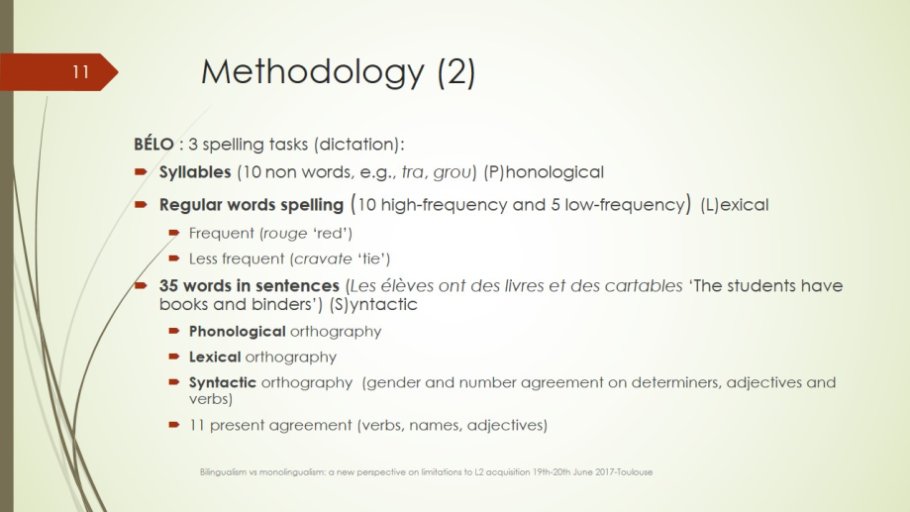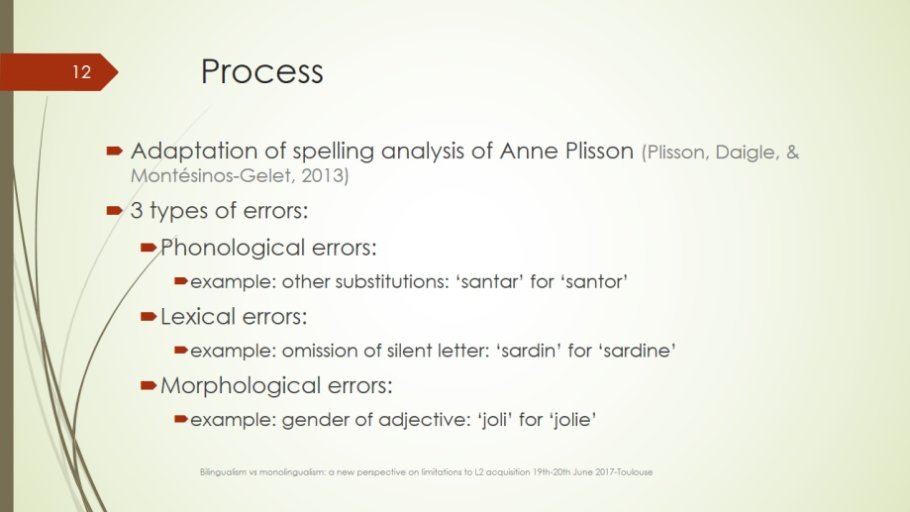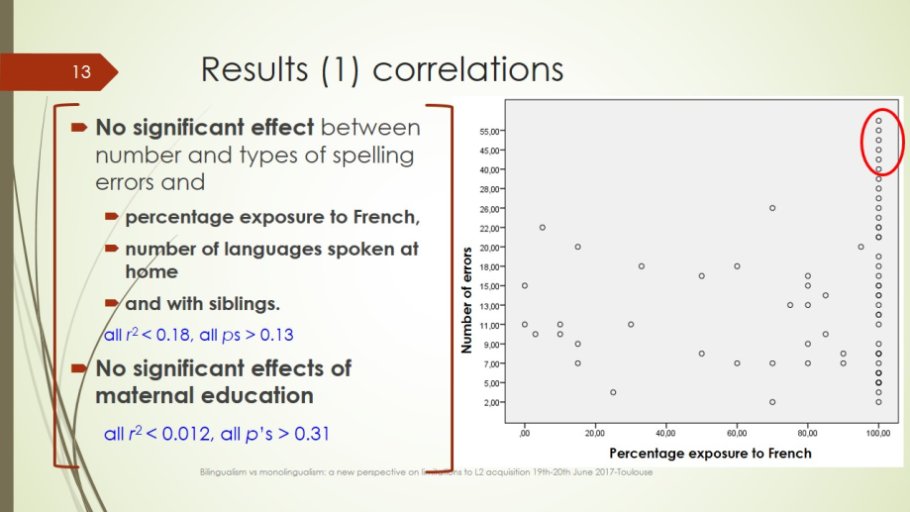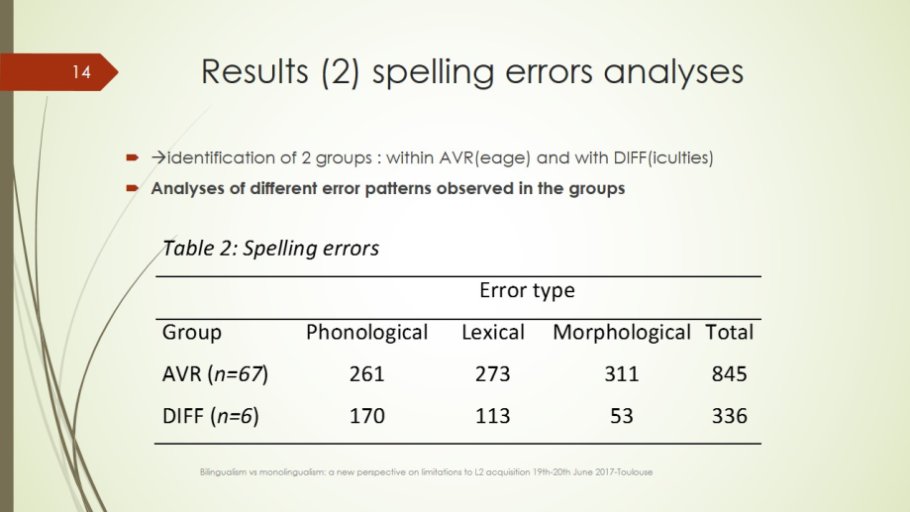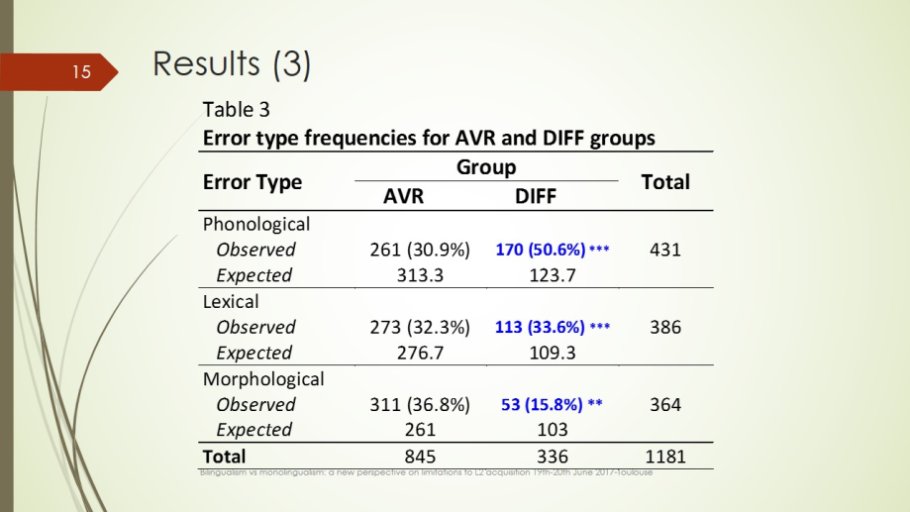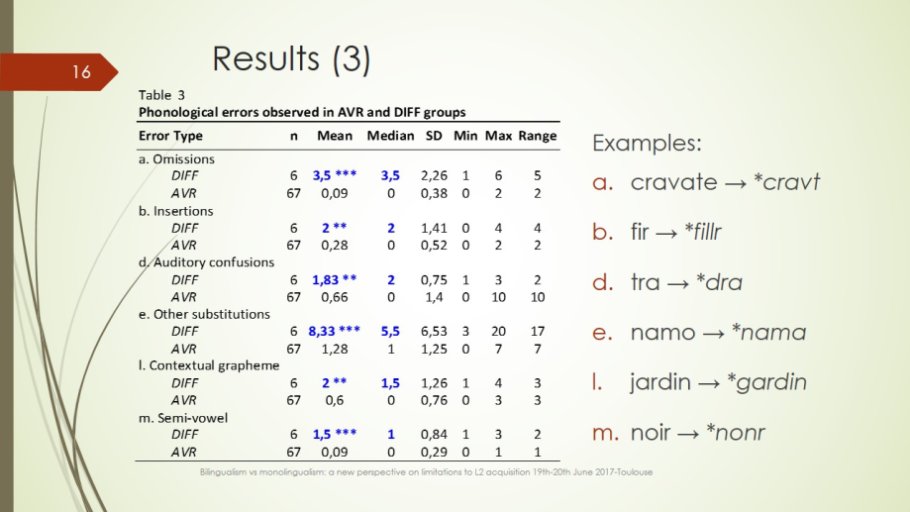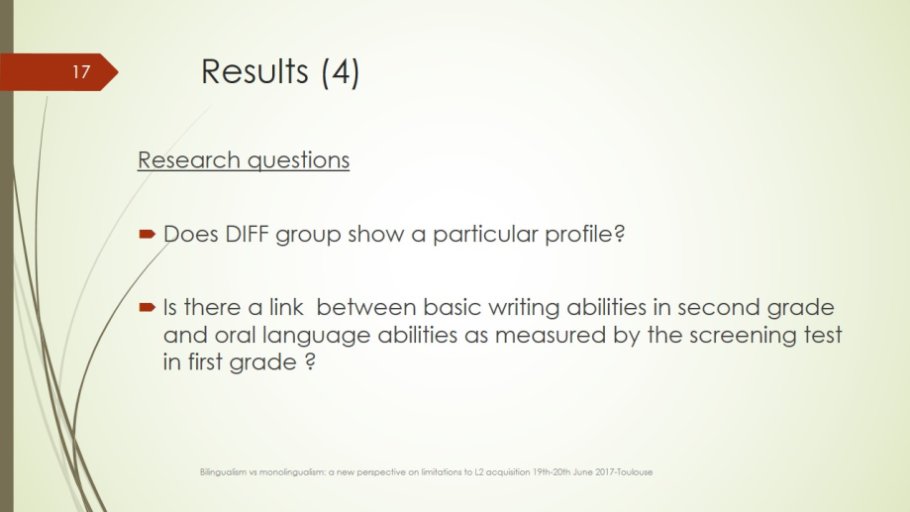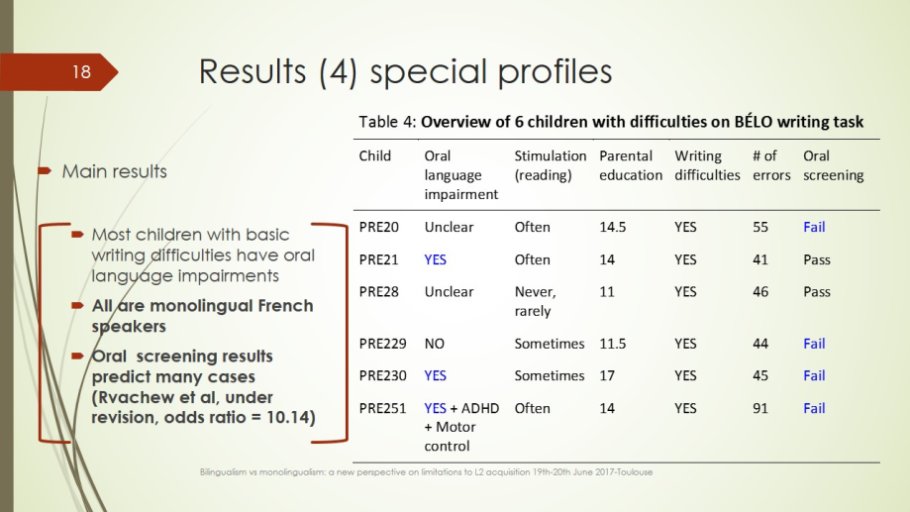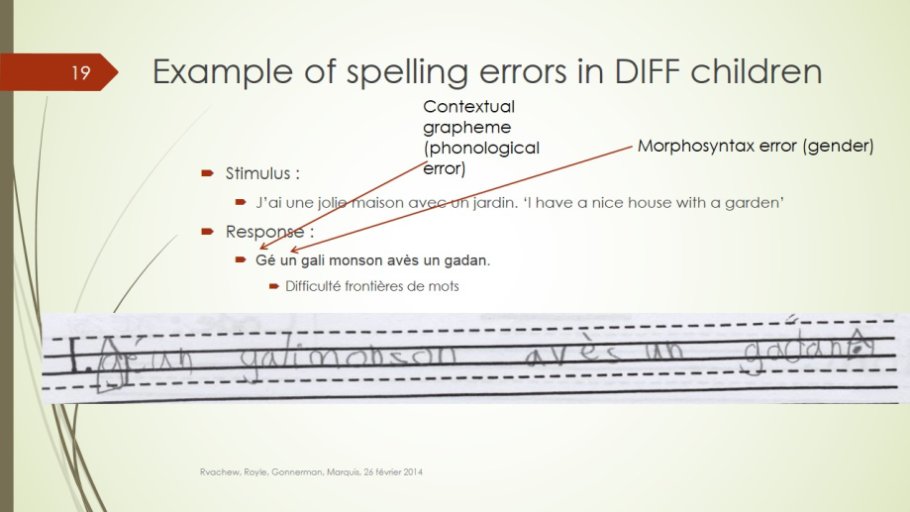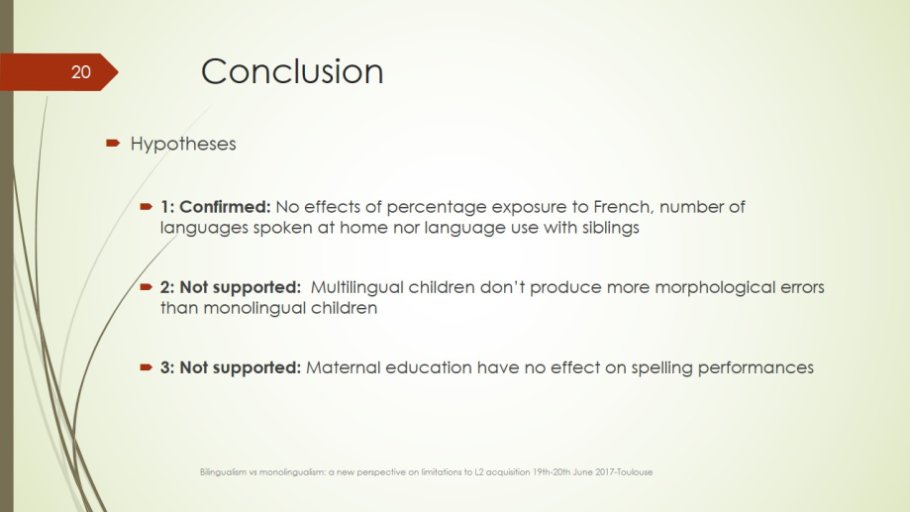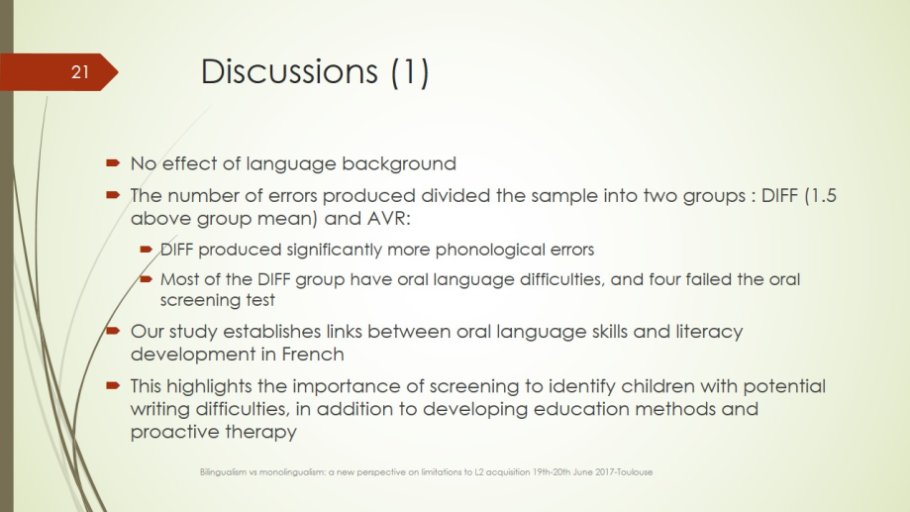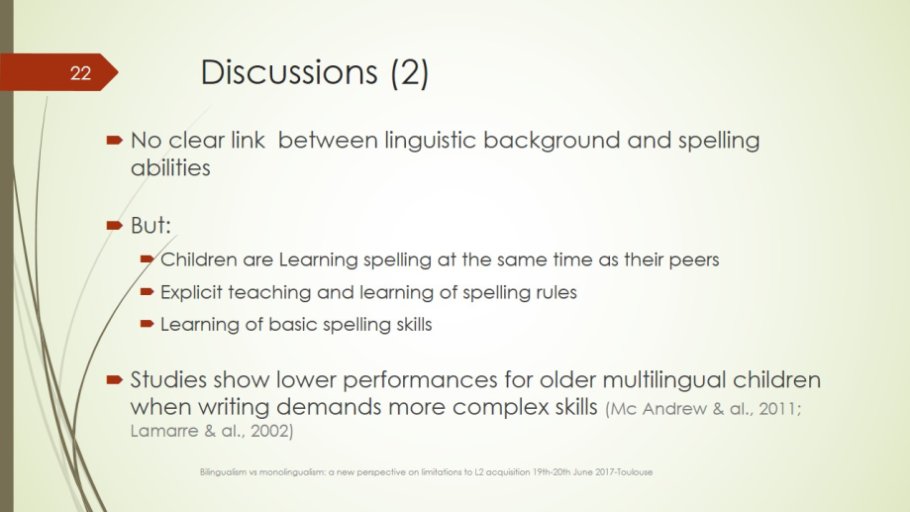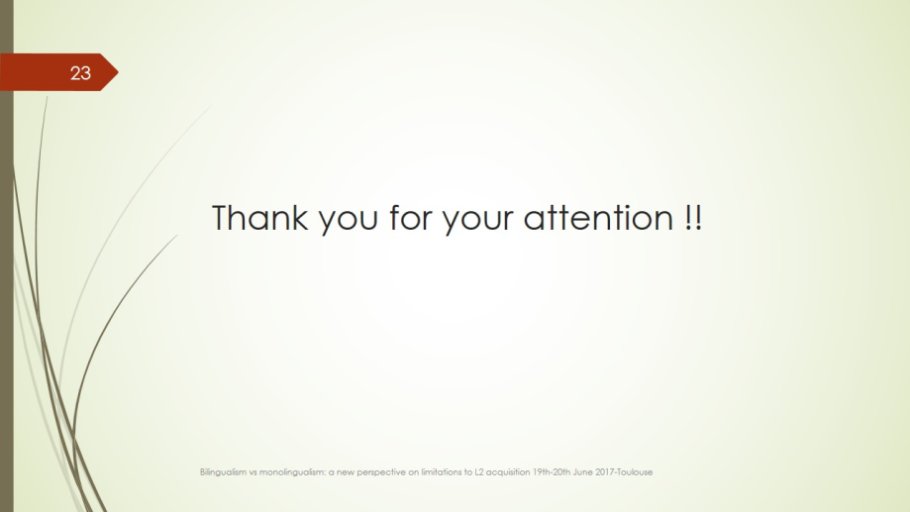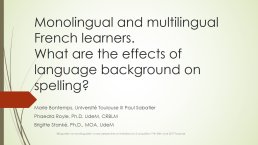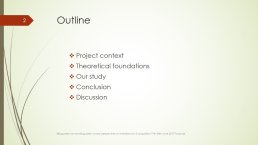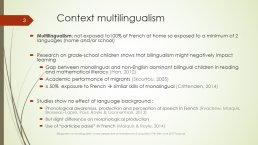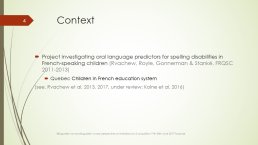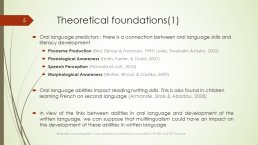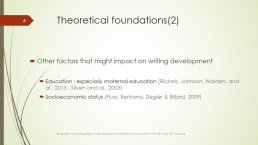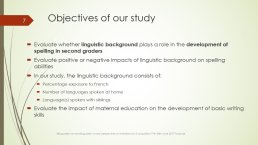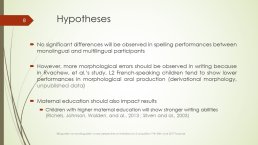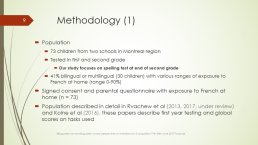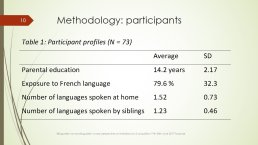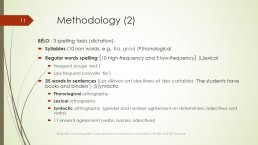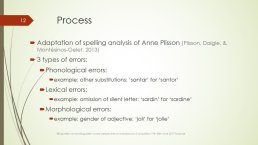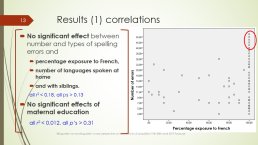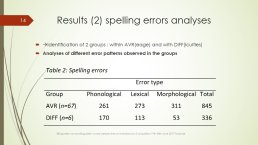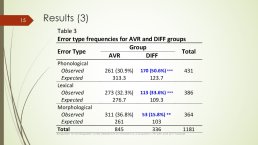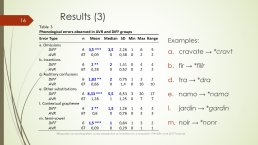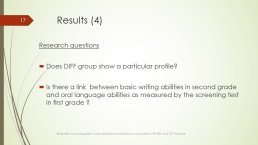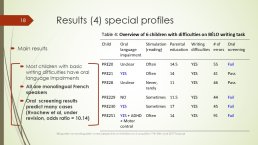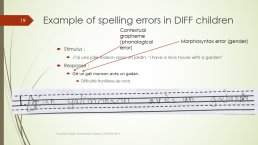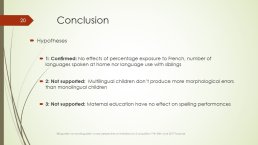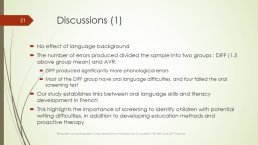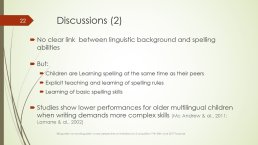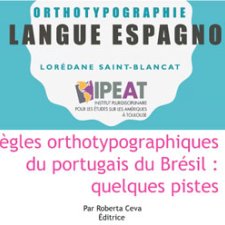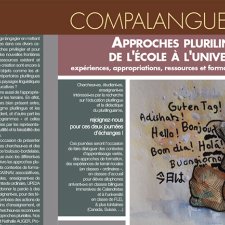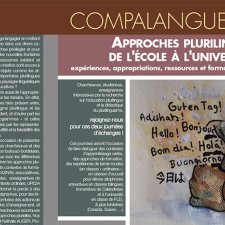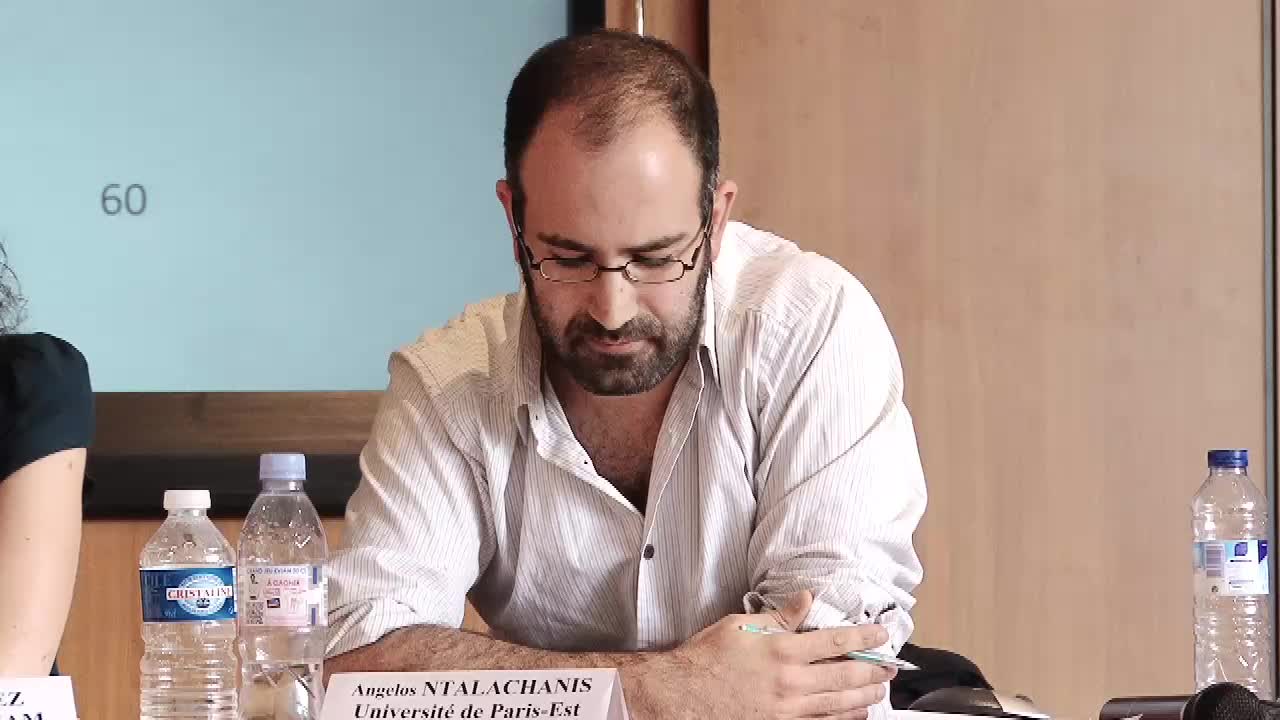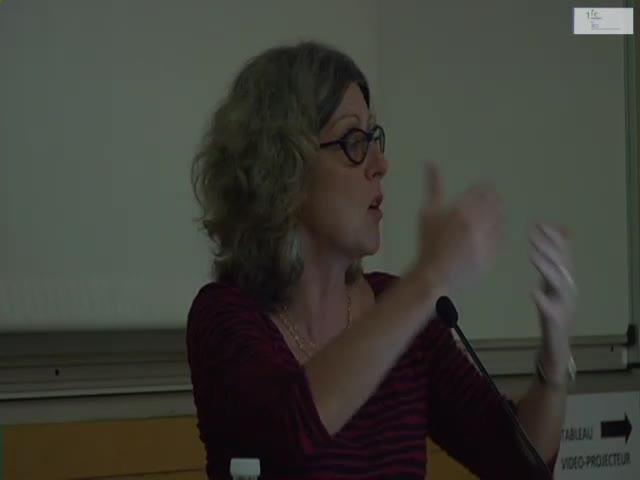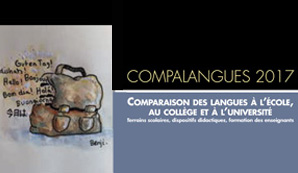Notice
Monolingual and multilingual learners of French. What are the effects of language background on spelling? / Marie Bontemps
- document 1 document 2 document 3
- niveau 1 niveau 2 niveau 3
Descriptif
Monolingual and multilingual learners of French. What are the effects of language background on spelling? / Marie Bontemps, in colloque "Bilingualism vs. monolingualism: a new perspective on limitations to L2 acquisition" organisé par le laboratoire Octogone-Lordat sous la responsabilité de Barbara Köpke (UT2J), Holger Hopp (Technische Universität Braunschweig), Tanja Kupisch (Universität Konstanz), Université Toulouse Jean Jaurès, 19-20 juin 2017.
Foran optimal learning of the written language, children have to master the orallanguage (Ouelette & Sénéchal, 2008). However, some studies show thatmultilingual children, who fully master their second language, encounter moredifficulties at school, in particular on reading (Han, 2012). Teachers tend tocategorize children from bi-/multilingual families as being at risk for writingdelays (Kolne et al, 2016). However, evidence shows that bilingualism might nothave a negative impact on decoding or spelling abilities (Bialystok et al,2012).
Thepurpose of this study is to evaluate the impact of oral language background andlanguage behaviour at home, or parentaleducation have on spelling in beginning writers of French. This study examined spelling knowledge usingthe BELO (George & Pech-Georgel, 2006) in 73 children (Table 1) at the end of 2nd grade. These children were recruitedfrom the French public school system in a suburb of Montreal, and exhibited awide range of immigration and linguistic profiles. Based on previous research(Han, 2012) we expected that slight differences between multilingual (MUL whospeak at least another language 10% to 100% of the time at home) and Frenchmonolingual (MON) participants would be seen on spelling errors.
Atelephone interview was conducted with parents to obtain demographic, literacy,health and language information via standard questionnaires. This interviewserved to identify parental education level, the number of spoken languages athome, languages spoken by siblings and exposure to the French language.
Todescribe the spelling errors found in the test, we developed an analyticalframework of spelling errors. These were grouped as phonological, lexical ormorphological. These data were then correlated with 1. parental education, 2.exposure to languages other than French, 3. number of spoken languages at homeor 4. number of languages spoken by siblings (Table 1).
Resultsshow no correlations between spelling abilities and the above-mentionedmeasures. Regardless of background, all children produce similar types andnumbers of spelling errors. We thus realised another analysis for spellingerrors on the BELO. Based on average number of errors two groups were formed;the first includes children within the average (AVR) and the second, thosebelow 1.5SD (DIFF). The DIFF group make many more errors than the AVR group, X2(2, N = 1187) = 58,24, p <.001 (Table 2). But also, makeatypical spelling errors signaling potential pathological behaviour. Errorpatterns will be discussed in our presentation.
Thème
Documentation
Bibliographie sélective
Caloi, Irene (2017). Additive focus particles in German-speaking learners of Italian as L2. In De Cesare, A. M., Andorno, C. M., Focus on additivity. Multiperspective and multifaceted views, Amsterdam, John Benjamins Publishing Company, 237-263.
Hernandez, Arturo E. (2009). Language switching in the bilingual brain: What's next?, Brain & Language, 109, 133-140.
Hofweber, Julia (2016). Effects of dense code-switching on executive control, in Irina A. Sekerina and Lauren Spradlin, "Bilingualism and Executive Function: An interdisciplinary approach", Linguistic Approaches to Bilingualism, 5, vol.6, 648–668.
Hopp, Holger & Schmid, Monika S. (2014). L'accent étranger perçu dans l'attrition L1 et l'acquisition de L2: l'impact de l'âge d'acquisition et du bilinguisme / Perceived foreign accent in L1 attrition and L2 acquisition, Psycholinguistique appliquée, 34 (2), 361-394. [En ligne : http://www.let.rug.nl/languageattrition/Papers/Hopp%20&%20Schmid%20forthc.pdf].
Kartushina, N., Frauenfelder, U. H. and Golestani, N. (2016), How and When Does the Second Language Influence the Production of Native Speech Sounds: A Literature Review, Language Learning, 52, vol. 66, 155–186. [En ligne : http://onlinelibrary.wiley.com/doi/10.1111/lang.12187/full].
Köpke, Barbara, Schmid, Monika (2011). L’attrition de la première langue en tant que phénomène psycholinguistique, Langage, Interaction and Acquisition / Language, Interaction et Acquisition (LIA), Amsterdam, John Benjamins Publishing Company, numéro spécial 2, vol. 2, 185-196.
Kupisch, T. (2012). Thèmes génériques en italien des premiers bilingues germano. Bilinguisme: Langue et Cognition 15 (4), 736-756.
Massa, E., Cortelazzo, F., El Yagoubi, R. & Köpke, B. (2016). Bilinguisme et contrôle exécutif : exploration neurofonctionnelle au moyen des méthodes potentiels évoqués et IRMf, Revue de Neuropsychologie, 2, 8, 126-136. {En ligne : http://www.jle.com/fr/revues/nrp/e-docs/bilinguisme_et_controle_executif_exploration_neurofonctionnelle_au_moyen_des_methodes_potentiels_evoques_et_irmf_307476/article.phtml].
Meisel, J. (2001). The simultaneous acquisition of two first languages. Early differenciation and subsequent development of grammars, in J. Cenoz & F. Genesee (éds.), Trends in Bilingual Acquisition, Amsterdam, John Benjamins Publishing Company, 11-41.
Meisel, J. (1989). Early differentiation of languages in bilingual children, in K. Hyltenstam & L. Obler (eds.), Bilingualism Across the Lifespan : Aspects of Acquisition, Maturity, and Loss, Cambridge, Cambridge University Press, 13-40.
Paradis, M. (2007). L1 attrition features predicted by a neurolinguistic theory of bilingualism, in B. Köpke, M. S. Schmid, M. Keijzer & S. Dostert (éds.), Language Attrition. Theoretical perspectives, Amsterdam, John Benjamins Publishing Company, 121-133.
Pérez-Leroux, A. T., Pirvulescu, M., & Roberge, Y. (2011). Topicalization and object omission in child language. First Language, 3, 31, 280-299. [En ligne : http://journals.sagepub.com/doi/pdf/10.1177/0142723710394384].
Royle, Phaedra, St-Denis, Ariane, Mazzocca, Patrizia, Marquis, Alexandra (2017). Insensitivity to verb conjugation patterns in French children with SLI, Clinical Linguistics & Phonetics. [En ligne : https://eoa.umontreal.ca/wp-content/uploads/sites/32/2017/07/publicationsRoyleP_verbConjugationPatternsFrenchSLI.pdf].
Rvache, S., Royle, P., Gonnerman, L. M., Stanké, B., Marquis, A., Herbay, A. (2017). Development of a Tool to Screen Risk of Literacy Delays in French-Speaking Children: PHOPHLO, Canadian Journal of Speech-Language Pathology and Audiology (CJSLPA), 3, vol. 41, 321-340. [En ligne : http://www.cjslpa.ca/detail.php?ID=1220&lang=en].
Sabourin, L. (2014). The bilingual advantage in the Stroop task: simultaneous vs. early bilinguals, in "L3 Acquisition: A Focus on Cognitive Approaches", Bilingualism: Language and Cognition, 2, vol. 18, 350-355.
Schmid, M.S. & Köpke, B. (2017). The relevance of first language attrition to theories of bilingual development. Linguistic Approaches to Bilingualism, 6, vol. 7, 637 –667 [En ligne : http://www.let.rug.nl/languageattrition/Papers/Schmid&Kopke2017.pdf].
Schmid, M S., Köpke, B., De Bot, K. (2013). Language attrition as a complex, non-linear development, International Journal of Bilingualism, 17 (6), 675-682.
Stoehr, A., Benders, T., Van Hell, J., & Fikkert, P. (2017). Heritage language exposure impacts voice onset time of Dutch–German simultaneous bilingual preschoolers, Bilingualism: Language and Cognition, 1-20. [En ligne : doi: 10.1017/S1366728917000116].
Stöhr, A., Akpınar, D., Bianchi, G., & Kupisch, T. (2012). Gender marking in L2 learners and Italian-German bilinguals with German as the weaker language, in K. Braunmueller & C. Gabriel (eds.), Multilingual Individuals Multilingual Societies, 153–170.
Van Osch, B. A., Aalberse, S. P., Hulk, A. C. J., & Sleeman, A. P. (2017). Knowledge of mood in internal and external interface contexts in Spanish heritage speakers in the Netherlands, in K. Bellamy, M. Child, M. C. Parafita Couto, P. González, & A. Muntendam (eds.), Multidisciplinary Approaches to Bilingualism in the Hispanic and Lusophone World, Amsterdam, John Benjamins Publishing Company, 67-94.
Dans la même collection
-
On Qualitative Differences between Types of Language Acquisition / Jürgen Meisel
MEISEL Jürgen M.
On Qualitative Differences between Types of Language Acquisition / Jürgen Meisel, in colloque "Bilingualism vs. monolingualism: a new perspective on limitations to L2 acquisition" organisé par le
-
Attrition and (incomplete) acquisition of Italian answering strategies / Irene Caloi
Attrition and (incomplete) acquisition of Italian answering strategies / Irene Caloi, in colloque "Bilingualism vs. monolingualism: a new perspective on limitations to L2 acquisition" organisé par
-
Do temporarily induced code-switching modes alternate executive performance in late sequential bili…
Do temporarily induced code-switching modes alternate executive performance in late sequential bilinguals?
-
Processing variability in L2 learning: insights from articulatory training / Natalia Kartushina, Cl…
Processing variability in L2 learning: insights from articulatory training / Natalia Kartushina, Clara Martin
-
Age-related effects on language control and executive control: a behavioral-electrophysiological in…
MASSA Émilie
Age-related effects on language control and executive control: a behavioral-electrophysiological investigation / Émilie Massa
-
Language, Development and the Bilingual Brain / Arturo E. Hernandez
HERNANDEZ Arturo E.
Language, Development and the Bilingual Brain / Arturo E. Hernandez, in colloque "Bilingualism vs. monolingualism: a new perspective on limitations to L2 acquisition" organisé par le laboratoire
-
Trilingual effects at the microstructure and macrostructure levels in children’s narratives / Mihae…
PIRVULESCU Mihaela
Trilingual effects at the microstructure and macrostructure levels in children’s narratives / Mihaela Pirvulescu, in colloque "Bilingualism vs. monolingualism: a new perspective on limitations to L2
-
Language Processing in Bilinguals: Distinguishing Early Sequential from Simultaneous / Laura Sabour…
SABOURIN Laura
Language Processing in Bilinguals: Distinguishing Early Sequential from Simultaneous / Laura Sabourin, Santa Vinerte, in colloque "Bilingualism vs. monolingualism: a new perspective on limitations to
-
Implicit causality as a predictive cue in child L1 and adult L2 processing of German: Evidence from…
Implicit causality as a predictive cue in child L1 and adult L2 processing of German: Evidence from visual-world eyetracking / Judith Schlenter
-
Cross-linguistic influence at the feature-level ? Evidence from Dutch-German bilingual preschoolers…
Cross-linguistic influence at the feature-level ? Evidence from Dutch-German bilingual preschoolers. How bilinguals are more monolingual-like than assumed / Antje Stoehr
-
Subject position in heritage Spanish in the Netherlands and the US: a case for cross-linguistic inf…
Subject position in heritage Spanish in the Netherlands and the US: a case for cross-linguistic influence / Brechje van Osch, in colloque "Bilingualism vs. monolingualism: a new perspective on
-
Can French-English bilinguals process verb-particle constructions in a native-like manner? A self-p…
Can French-English bilinguals process verb-particle constructions in a native-like manner? A self-paced reading study / Alexandre Herbay, in colloque "Bilingualism vs. monolingualism: a new
Sur le même thème
-
Dis-moi comment tu parles
LENART Ewa
LAMALLE CABARRUS Aurélie
DIAKITE Edwige
NGUYEN Minh The
AMMARI Lila
Ce film a été réalisé dans le cadre de la recherche-action "le plurilinguisme à l'école primaire : valoriser les langues d'héritages pour une école et une société inclusives" Avec l'aimable
-
L'orthotypographie en langue espagnole et en langue portugaise
Ce webinaire s'inscrit dans une série de webinaires courts, de 1 heure environ, qui vise à offrir aux éditeurs et éditrices francophones travaillant sur des revues ou ouvrages en langue étrangère une
-
Approches plurilingues de l'école à l'université. Grands Témoins : Mariella Causa, Claudine Garcia-…
GARCIA-DEBANC Claudine
CAUSA Maria
Les journées COMPALANGUES 2021 sont l’occasion de remettre en réflexion et dialogue les problématiques travaillées dans les journées COMPALANGUES 2015 et 2017, ainsi que dans le colloque LIVRE
-
Inclusion linguistique des enfants plurilingues en classe ordinaire : entre approbation et réticenc…
PEREGO Christine
À partir de son expérience de chargée de formation et formatrice au CASNAV [centre académique pour la scolarisation des élèves allophones nouvellement arrivés (EANA)] de l'académie de Lyon, et en tant
-
Du multilinguisme « cosmopolite » à l’option arabe : stratégies linguistiques et redéfinition de l…
Νταλαχάνης Άγγελος
Panel 2 : Éducation et enseignement, entre savoirs locaux et logiques impériales Dire et écrire le pouvoir impérial en Méditerranée, XIXe-XXe siècles Journée d’études organisée le 8 juin 2012 de
-
La pluralité des langues
ARMAND Françoise
Éducation et diversité Première rencontre du Réseau international Éducation et diversité (RIED) 20-22 octobre 2014, École supérieure du professorat et de l’éducation, Marseille
-
Compalangues 2017 : ouverture / Marie-Christine Jaillet, Christine Vergnolle, Cécile Fabre, Euriel…
JAILLET Marie-Christine
GOBBé-MéVELLEC Euriell
VERGNOLLE-MAINAR Christine
FABRE Cécile
Compalangues 2017 : ouverture / Marie-Christine Jaillet, Christine Vergnolle, Cécile Fabre, Euriell Gobbé-Mévellec
-
Compalangues : Qu'es aquô ? / Claudine Garcia-Debanc, Chantal Dompmartin
GARCIA-DEBANC Claudine
DOMPMARTIN-NORMAND Chantal
Compalangues : Qu'es aquô ? / Claudine Garcia-Debanc, Chantal Dompmartin
-
Pratiques d'enseignement plurilingue : contraster, comparer, intégrer, alterner / Laurent Gajo
GAJO Laurent
Pratiques d'enseignement plurilingue : contraster, comparer, intégrer, alterner / Laurent Gajo
-
Les approches plurielles au service de la didactique de l’anglais / Rebecca Dahm
DAHM Rebecca
Les approches plurielles au service de la didactique de l’anglais / Rebecca Dahm
-
Livre Ensemble : des albums plurilingues et pluriculturels pour rencontrer l'autre à travers la lit…
GOBBé-MéVELLEC Euriell
Livre Ensemble : des albums plurilingues et pluriculturels pour rencontrer l'autre à travers la littérature / Euriell Gobbé-Mévellec
-
Comparer les langues en école et collège Calandreta : pratiques enseignantes / Émilie Chorin
CHORIN Emilie
Comparer les langues en école et collège Calandreta : pratiques enseignantes / Émilie Chorin

